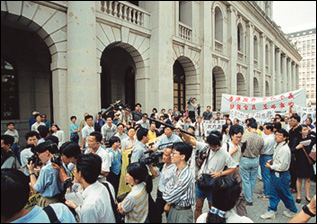South China Morning Post, November 6, 1996

A Threat to Our Rights
By Martin C.M. Lee
Wang Dan's sentencing augurs badly for our democratic freedoms after the handover, writes Martin Lee
What does Wang Dan's fate have to do with me? Many people in Hong Kong may believe that the fate of 27-year-old former student leader Wang, jailed for 11 years in China last week, has little or nothing to do with them.
They may believe that the promise of "one country, two systems" will protect our rights and freedoms, that we have the luxury of living in a very different system from China and our system will continue unchanged, as pledged.
Local pro-China leaders constantly issue reassurances that China's system
and laws will not be imposed on Hong Kong. But will our legal system remain
unchanged ?
Acting in accordance with the Constitution of the People's Republic of China, Wang Dan exercised his right to free expression and to criticize the government. He was ultimately convicted of "plotting to subvert the government" and sentenced for doing something we do every day in Hong Kong - writing articles in newspapers.
The Vice-Premier and Foreign Minister, Qian Qichen, declared last Saturday that the Basic Law guaranteed present-day rights of speech, press, assembly and other personal freedoms, - but with the caveat that "the Basic Law also outlawed sedition, subversion, theft of state secrets and links with foreign political groups. Both aspects of the Basic Law should be taken into account".
The foreign minister's ambiguous statements and Wang's trial demonstrate once again that Chinese leaders' understanding of the concept of "one country, two systems' is not the same as our when they say we will continue to enjoy our freedoms "with Chinese characteristics".
Could Wang's fate befall any of us in Hong Kong? In Hong Kong, we will soon have subversion laws of our own, for Basic Law Article 23 states: "The Hong Kong SAR shall enact laws on its own to prohibit any act of treason, secession, sedition, subversion against the Central People's Government, or theft of state secrets...."
After July 1, 1997, the Beijing appointed "provisional" legislature will pass a law against "subversion" - a concept that runs contrary and is alien to Hong Kong's common law and courts.
The whole point of democracy is to have a legislature that passes law acceptable to the people. Yet, in Hong Kong, China's new appointed legislature will not be accountable to Hong Kong people but rather to Beijing alone.
Chinese leaders have recently said they would set up their appointed legislature by Christmas at the latest.
We do not have to guess what laws this appointed legislature will pass. Beijing has already pledged to emasculate Hong Kong's Bill of Rights and to renew draconian colonial laws restricting press freedom, freedom of assembly and expression.
To this list of repressive laws, we can certainly add subversion and the other crimes set out at Article 23 of the Basic Law.
China's plans for subversion laws surfaced in the first draft of the Basic Law, but Hong Kong drafters voiced strong opposition, and but the second draft of the Basic Law, subversion was not included in Article 23.
But the Basic Law was finalized in a time of mistrust following the Tiananmen Square massacre, and the final version was a dramatic regression, reinstating subversion as a crime.
Subversion is a concept foreign to the common law system (which under the Joint Declaration shall continue to apply to Hong Kong), and this crime cannot be reconciled with the values or the precedents of the common law system.
Subversion is a communist law concept which will be imposed on our common law system, and which will unavoidably undermine the non-political nature of the Hong Kong courts. Like the crime of counter-revolution - ironically soon to be taken off China's own statue books - it is by nature a political crime, a political law.
The rule of law has tow essential requirements: an independent judiciary, yes - but also good laws. Once the elected Legislative Council is replaced by an appointed one, Hong Kong people can no longer rely on our legislature to pass laws to protect basic human rights. A new, fully appointed legislature will pass repressive laws as directed by Beijing.
In Weimar Germany before World War II, German judges applied the laws and saw that justice was done for German people. But after Adolf Hitler came to power, he changed the laws through control of the legislature.
Although Germany's judges continued to apply the laws, they were doing grave injustices to the Jewish and German people. There is good reason to fear that history will be repeated in Hong Kong.
No matter how independent our judges may continue to be, they will have to apply the law as they find it. Hence the demise of our elected legislature will mean China's definition of subversion will be applied through our courts.
Thus China's trial of Wang Dan and definition of subversion should be matter of concern for all Hong Kong people, as should be the impending appointment of a second legislature by Beijing.
Today I am free to write commentaries in this and other newspapers. People can (and do) criticize me and other political figures. We are free to criticize Governor Chris Patten and British Prime Minister John Major.
It is a liberty my party members and I frequently exercise. But there is good reason to question whether I or anyone else will be able to exercise this freedom of expression after 1997.
As we debate the motion on Wang Dan in the Legislative Council this afternoon, I will think of one thing: today, Wang Dan, Tomorrow, you and me.
Copyright © 1998 The Democratic Party. All Rights Reserved.
Next Media Group Management Ltd. owns the copyright of some featured photographs, the use of which for commercial purposes will result in legal prosecution.